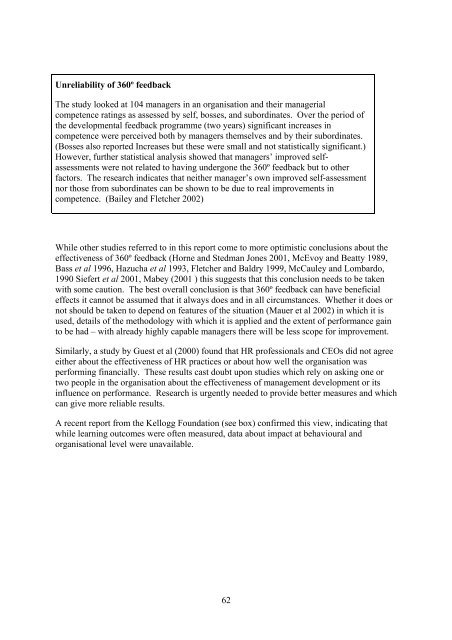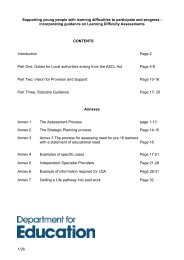The Development of Management and Leadership Capability and its ...
The Development of Management and Leadership Capability and its ...
The Development of Management and Leadership Capability and its ...
You also want an ePaper? Increase the reach of your titles
YUMPU automatically turns print PDFs into web optimized ePapers that Google loves.
Unreliability <strong>of</strong> 360º feedback<br />
<strong>The</strong> study looked at 104 managers in an organisation <strong>and</strong> their managerial<br />
competence ratings as assessed by self, bosses, <strong>and</strong> subordinates. Over the period <strong>of</strong><br />
the developmental feedback programme (two years) significant increases in<br />
competence were perceived both by managers themselves <strong>and</strong> by their subordinates.<br />
(Bosses also reported Increases but these were small <strong>and</strong> not statistically significant.)<br />
However, further statistical analysis showed that managers’ improved selfassessments<br />
were not related to having undergone the 360º feedback but to other<br />
factors. <strong>The</strong> research indicates that neither manager’s own improved self-assessment<br />
nor those from subordinates can be shown to be due to real improvements in<br />
competence. (Bailey <strong>and</strong> Fletcher 2002)<br />
While other studies referred to in this report come to more optimistic conclusions about the<br />
effectiveness <strong>of</strong> 360º feedback (Horne <strong>and</strong> Stedman Jones 2001, McEvoy <strong>and</strong> Beatty 1989,<br />
Bass et al 1996, Hazucha et al 1993, Fletcher <strong>and</strong> Baldry 1999, McCauley <strong>and</strong> Lombardo,<br />
1990 Siefert et al 2001, Mabey (2001 ) this suggests that this conclusion needs to be taken<br />
with some caution. <strong>The</strong> best overall conclusion is that 360º feedback can have beneficial<br />
effects it cannot be assumed that it always does <strong>and</strong> in all circumstances. Whether it does or<br />
not should be taken to depend on features <strong>of</strong> the situation (Mauer et al 2002) in which it is<br />
used, details <strong>of</strong> the methodology with which it is applied <strong>and</strong> the extent <strong>of</strong> performance gain<br />
to be had – with already highly capable managers there will be less scope for improvement.<br />
Similarly, a study by Guest et al (2000) found that HR pr<strong>of</strong>essionals <strong>and</strong> CEOs did not agree<br />
either about the effectiveness <strong>of</strong> HR practices or about how well the organisation was<br />
performing financially. <strong>The</strong>se results cast doubt upon studies which rely on asking one or<br />
two people in the organisation about the effectiveness <strong>of</strong> management development or <strong>its</strong><br />
influence on performance. Research is urgently needed to provide better measures <strong>and</strong> which<br />
can give more reliable results.<br />
A recent report from the Kellogg Foundation (see box) confirmed this view, indicating that<br />
while learning outcomes were <strong>of</strong>ten measured, data about impact at behavioural <strong>and</strong><br />
organisational level were unavailable.<br />
62
















